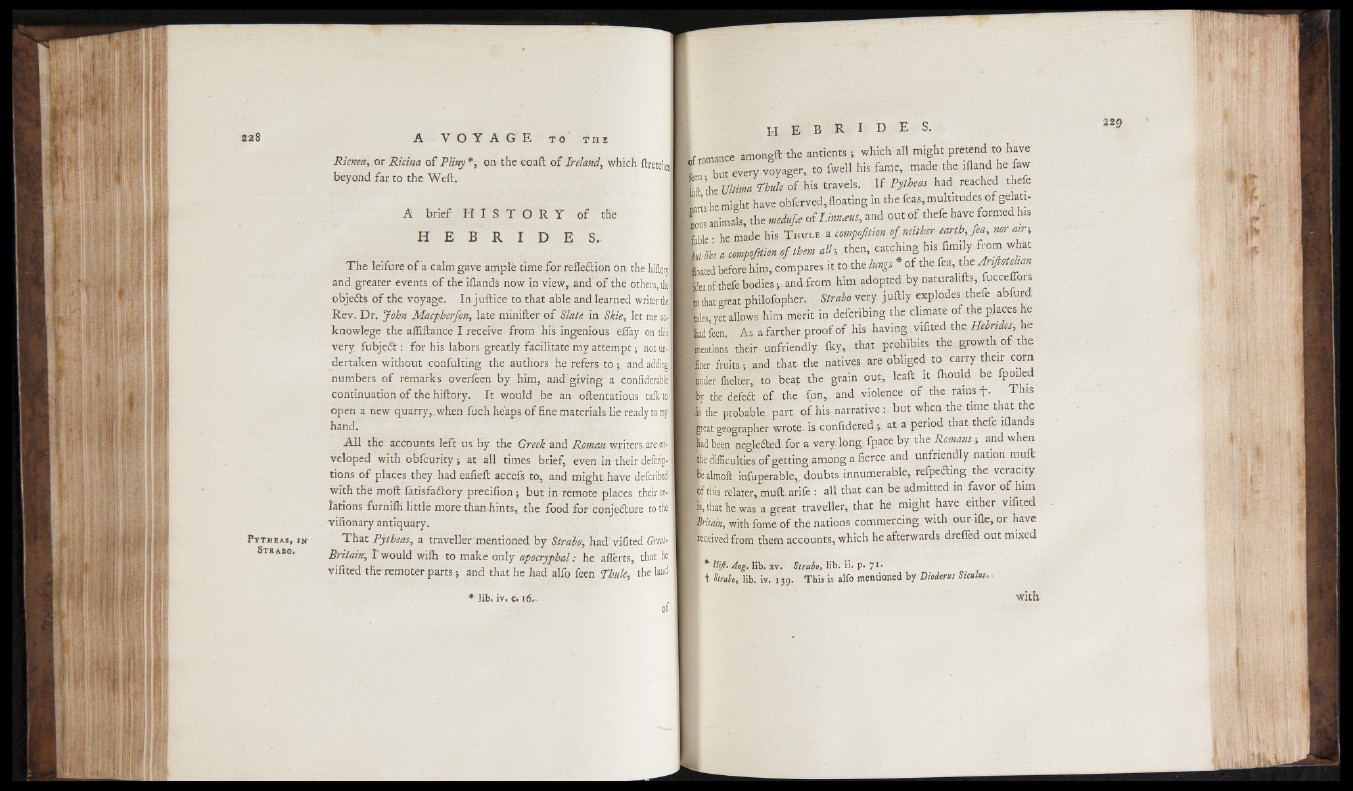
PvTHEAS, IJf
S t r a b o .
Ricnea, or Ricina o f Pliny *, on the eoaft of Ireland, which ftrctdJ
beyond far to the Weft.
A brief H I S T O R Y of the
H E B R I D E S..
The leifure of a calm gave ample time for refledtion on the hiiloJ
and greater events o f the ¡(lands now in view, and of the others, the]
objefts o f the voyage. In juffiice tothat able and learned writer thel
Rev. Dr. John Macpherfon, late minifter o f Slate in Skie, let me ac-J
knowlege the affiftance I receive from his ingenious eflay on tfciil
very fubjeift : for his labors greatly facilitate my attempt; not uiyj
dertaken without confulting the authors he refers to;, andaddintl
numbers of remarks overfeen by him, and giving a confiderabifl
continuation of the hiftory. It would be an oftentatious tafk.to]
open a new quarry,, when fuch heaps of fine materials lie ready to mjr I
hand.
A ll the accounts left us. by the Greek m i Roman writers are e-c-
veloped with obfcurity; at all times brief, even in their defcrip- j
tions o f places they, had eafieft accefs to, and might, have defcribed j
with the moft fatisfadory precifion; but in remote places their re.;
latiotis furnilh little more than hints, the food for conjedure to the i
vifionary antiquary.
That Pytheas, a traveller-mentioned by Strabo, had vifited Greet’
Britain, I would wiih to make only apocryphal .■ he afterts, that he
vifited the remoter parts; and that he had alfo feen Thule, the land
* lib. iv. c. 16,
of
1 J L s amoneft the antients; which all might pretend to have
|en • but every voyager, to fwell his fame, made the ifland he few | | | Jjg|
I ’the Ultima Thule of his travels. I f Pytheas had reached thefe
I ; he might have obferved, floating in the feas, multitudes of gelati- ^
lous animals, the meduf<e of Linnaeus, and out o f thefe have formed his
i j . he made his T h u le a compfition of' neither earth, fea, nor air,
K Be a compofition of them a ll; then, catching his fimily from what
Boated before him, compares. it to the lungs * of the fea, the Anftotehan
le a o f thefe bodies, and from him adopted by natural,fts, fucceffors
to that great philofopher. Strabo very j uftly explodes thefe abfurd
Kies, yet allows him merit in defcribing the climate of the places he
Bad feen. As a farther proof of his having vifited the Hebrides, he
Kentions their unfriendly iky, that prohibits the growth of the
Bner fruits -, and that-the natives are obliged to carry their corn
|nder ihelter, to beat the grain out, leaft it Ihould be fpoi e
i y the defeft of. the fun,, and violence of the rains f . This
Is the probable, part, of his narrative :■ but when the time that the
treat geographer wrote is confidered ;, at a period that thefe lflands
lad been neglefted.for a very, long fpace by the Romans; and when
lie difficulties of getting among a fierce and unfriendly nation muft
lealmoft. infuperable, doubts innumerable, refpefting the veracity
I f this relater, muft arife : all that can be admitted in favor of him
that he was a. great traveller, that he might have ekher vifited
mritm, with fome of the nations commercing with our ifle, or have
leceived from them accounts, which he afterwards dreffed out mixed
1 ttifi, Ang. lib. xv. Strabo, lib. ii. p. 71*
I t. Strabo, lib. iv, j 39. This is alfo mentioned by Diodorus Sicultu. -
with